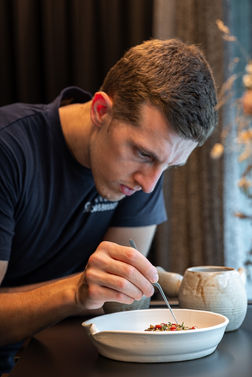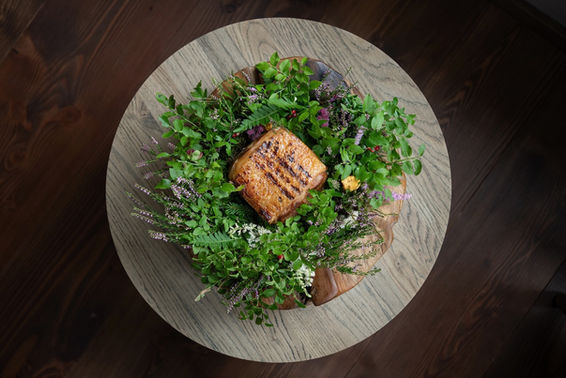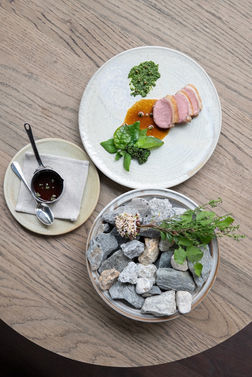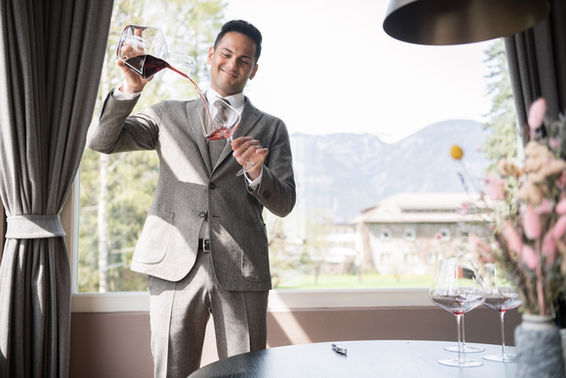Norbert Niederkofler (Atelier Moessmer Norbert Niederkofler): The fabric of ethical cuisine

(c) 360Crossmedia
Norbert Niederkofler made history last year when he received 3 Michelin stars and the Green Star, 4 months after opening his new restaurant in Brunico: A record. He had already obtained the highest red distinction in 2017 in St. Hubertus Restaurant with Hotel Rosa Alpina, but this time is different. A report from Brunico by Jerome Bloch
Context matters
“Chapeau to Michelin!” is what Norbert Niederkofler said when he received his third Star in 2017, with “beetroot and potatoes”. He had been working since 1994 at Hotel Rosa Alpina, patiently developing his ethical concept. At the time of his triple decoration, he was commuting one hour every day from Brunico – where his family is based - to San Cassiano and back. 100 meters away from his home in Brunico was a big loden factory called “Moessmer”. In the middle ages, loden was produced and worn by peasants in Tyrol. It became highly fashionable during the XIXth century when Moessmer created a white loden coat for Emperor Franz Joseph. When the owner and President from Moessmer, Paul Oberrauch, asked Niederkofler if he had an idea for the beautiful villa on their premises, the famous cook answered: “Sure, if you have the money”. Fast forward to 2023: the restaurant “Atelier Moessmer Norbert Niederkofler” opened its door in July on the industrial site of the famous fabric producer in a beautiful villa that used to be the home of Moessmer’s top managers during many years. No more commuting. No time to waste.

©LorenzoPolatoxUEBE
„I want to inspire the world with the spark of ethical cuisine, in order to change the way we eat, collaborate and live.“
Norbert Niederkofler - The Ethical Chef.
Cook the mountain
“I hate the word ‘Sustainabilty’. This idea is more about respecting people, animals, farmers and nature” said Chef Niederkofler, who gives a lot of room to his colleagues, but within a clear framework: no olive oil, no citrus fruits, no greenhouses and no waste. They strictly source all ingredients locally but there is a twist. One third of what arrives in the restaurant is used for the menu and two-thirds are stored for next winter through various conservation and fermentation techniques. During 3 months, the mountain gives nothing, so you better be prepared. “In spring, we go from wait, wait, wait to run, run, run!”. The idea sounds simple but its implementation is extremely complex: first, you need to master a wide range of techniques to produce world class dishes with very simple ingredients – no lobster, no caviar -, and then you need to adapt on a daily basis. After three days of rain for example, you can no longer source wild herbs. That is part of the game, which is reflected by the mission statement of Norbert Niederkofler: “I want to inspire the world with the spark of ethical cuisine, in order to change the way we eat, collaborate and live”.

©dalge

©PaoloRiolzi

©PaoloRiolzi
From journeys to empowerment
“Our villa is a private house, not a restaurant. We designed it as a think-tank where people train, work and innovate”. Niederkofler took a step back. He is here to share his experience, talk to guests and empower everyone around him: local producers, Brunico’s economy, universities, partners and his team. “I put young people in pole position: the average age is 26. Usualy, they stay 2 to 3 years and move on to the next destination of excellence”. Mauro Siega, his executive chef is 31, but when he tells you about his experiences in Tuscany, London, Venice, Australia, France, Denmark – at Kadeau and Noma – and Tyrol, he demonstrates a furious taste for journeys, something he shares with his boss! Niederkofler told me: “My father died when I was 16. I had 4 sisters and no money but I wanted to travel the world”. He worked in London, Zurich, Milano; New York with David Bouley where he learnt innovation and Monaco with Eckart Witzigmann - his mentor - who taught him the love for nature. “Being open-minded is key”: it doesn’t matter where you are, in Scandinavia or Peru! Find similarities and differences. Bring the best thoughts here and enhance the local culture. The quest is not just about perfection, it is about constant improvement. In the end he says, what truly matters is: “Do not get bored!”
“Bring the best thoughts to Brunico and enhance the local culture”.
Side dishes
Apart from the restaurant itself, Niederkofler is involved in social impact activities. He co-founded Mo-Food in 2015, which is promoting an ethical culture of food. One of the projects, “CARE’s - The Ethical Chef Days”- went from 50 to 1200 participants. “We are resetting the project at the moment, as I always do”. The chef normally works with a 5-year-plan, and he resets it after 3 years: A simple way to sustain the creativity and the motivation of the team. In 2018, he opened AlpiNN, a sustainable restaurant at an altitude of 2.235 meters, on top of Plan de Corones, the biggest ski area in Italy. It is located next to Lumen, the “Museum of Mountain Photography” and 400 meters away from the “Messner Mountain Museum Corones” designed by Zaha Hadid. “50 to 60% of food is thrown away in the Western world. We should pay farmers more and use everything they give us. And we need to work with schools, consumers and big companies to develop new techniques and adapt mindsets”, he concludes.

©Alpinn.it

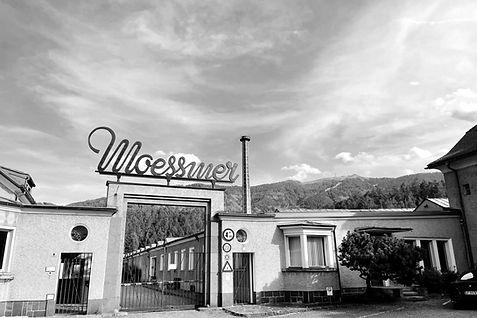
The experience
First, you ring the bell and get welcomed like a friend. Aperitif is enjoyed on the terrace or in the ex-living room of the villa. Dinner is served on the Veranda for a small group, in the salon, or in the open kitchen that was designed by Mauro Siega with a predominant open fire. This guy is a maniac, in the kitchen, but also in the mountains at 6 a.m., foraging. He relentlessly accumulates knowledge and technique to make the “Cook the Moutain” philosophy work. Together with Niederkolfer, Lukas Gerges - the restaurant manager and head sommelier – and the rest of the team, they adopt a singular approach where the frontier between roles dissolves: your next plate may be delivered by a cook, the Sommelier or another colleagues, it doesn’t matter. All of them are equally competent to perform what matters the most: explain. Gerges’ double wine pairing was quite riveting: with almost each dish, he serves two different wines, which triggers an interesting game of exploration and contrasts. I sat on the terrace with Norbert Niederkofler at midnight, reflecting on this powerful experience. This is what he answered when I asked about the importance of communication: “Communication is very important, not just in the kitchen or in the dining room. We need to explain what we do. We need to give a face to each product, and if we want our projects and restaurants to be sustainable, we need the communicate properly in order to reach the right numbers”.




